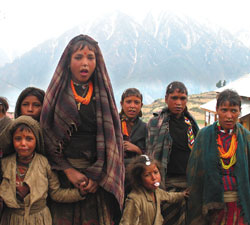|
|
Apartheid in South Africa is long gone and lamented only by bigots and loonies. But one image remains with me from those days, strangely enough not related to racial exclusion.
A British television documentary team spent a day with PW Botha, then president of South Africa. It was a part of a series called something like "A Day in the Life of.." The show featured good and evil people, showing them in the most banal of settings, to help us figure them out.
One scene with Botha stands out. He comes in from riding a horse on his ranch, tosses a Tyrolean hat across the room, and says, "Where are the women, I need some tea." In that South African accent that sounds so lordly and condescending-at least from a white racist.
It's a question-minus the tea-that I often ask myself about Nepal\'s peace process, reinvention, turmoil, call it what you will. Where are the women?
Let's be honest. Nepali Hindu society is hugely patriarchal. In some parts of the country, men behave towards women much as the Taliban did in Afghanistan, with even less concern for their dignity and safety, I daresay. One only has to conjure up those tales of caste Hindu women in western Nepal working in the fields with prolapsed uteruses and toxic shock syndrome while the men sit drinking in a speakeasy, debating politics and preparing for a night's spousal abuse.
It's true that urban life and generational change is gradually improving female prospects in this country. But even in Kathmandu, being female is a hurdle to overcome, unless of course one is rich or privileged or has a handy surname and a famous father. This city has merely reinvented patriarchy and most of the gains are slight or illusory.
Look at the news media. Almost all of the stories are about the doings of men, and if women are covered, they are involved in \'women's issues\'-mother's groups, domestic violence, fighting for their rights. Just once I'd like to see a story in the business section about a new bank or tourist company, headed by a woman.
Not that we need women to highlight their own inequality for the rest of us. We should be aware and working hard to end it already. Offices should be hiring, training, and promoting women. The international sector has a huge responsibility here. It needs to stop hiring women from famous families and lead the way into a meritocracy where gender is all but invisible.
As for political parties, the sooner they open their ranks to women of merit and ability, the better. Think Margaret Thatcher, Gro Haarlem Brundtland, Hillary Clinton, and Michelle Bachelet. Can any of the current male leaders of any party out there possibly have any reasonable objection to this?
Nepal is poor and in political turmoil for many reasons. Feudalism, an inept and venal elite, inexperience, lack of education and so on. But primarily, the continuing patriarchal attitudes of Nepali men and, yes, women, keep this country in the state it's in.
Maybe we should start with men making their own tea.




